dubai leaks pdf

Dubai Leaks PDF reveals extensive property ownership details in Dubai‚ exposed in 2022‚ uncovering 274‚000 owners of 800‚000 properties‚ including 191‚000 foreigners. It highlights criminal and sanctioned individuals‚ sparking global interest and concerns over financial secrecy.

Background of Dubai Leaks
The Dubai Leaks PDF originated from data gathered in 2020 and revealed in 2022‚ exposing property ownership details. It involved collaboration between investigative groups and media‚ shedding light on Dubai’s real estate as a hub for illicit activities.
2.1. Origins of the Dubai Leaks
The Dubai Leaks originated from a collaborative effort between investigative journalism initiatives and whistleblowers. The data‚ initially collected in 2020‚ was later analyzed and published in 2022 by organizations like the Center for Advanced Defense Studies (C4ADS) and Norwegian financial newspaper E24. These groups aimed to uncover the secretive property market in Dubai‚ which had long been a haven for illicit financial activities. The leak involved multiple sources‚ including property records and residency documents‚ which provided unprecedented insight into the ownership of luxury properties across Dubai. This data was further enriched by cross-referencing with other leaks from 2016 and 2020‚ creating a comprehensive dataset. The collaboration between international investigative bodies and media outlets played a pivotal role in bringing this information to light‚ highlighting Dubai’s role as a global financial hub with significant gaps in enforcement and secrecy.
2.2. Significance of the Leaked Data
The leaked data from Dubai Leaks PDF holds immense significance as it exposes the extensive property ownership details of individuals and entities in Dubai. This information‚ spanning over 800‚000 properties‚ reveals the involvement of foreign nationals‚ criminal organizations‚ and politically exposed persons (PEPs) in Dubai’s real estate market. The data sheds light on how Dubai has become a hub for illicit financial activities‚ including money laundering and corruption. By identifying sanctioned individuals and criminals owning property in Dubai‚ the leak highlights the emirate’s vulnerability to exploitation by global kleptocrats and organized crime. Furthermore‚ it underscores the role of Dubai’s secretive financial systems and lax enforcement in attracting such actors. The leak has far-reaching implications for international efforts to combat financial crimes and improve transparency in global real estate markets. It also raises questions about the UAE’s commitment to curbing illicit activities and its impact on international relations and sanctions policies.
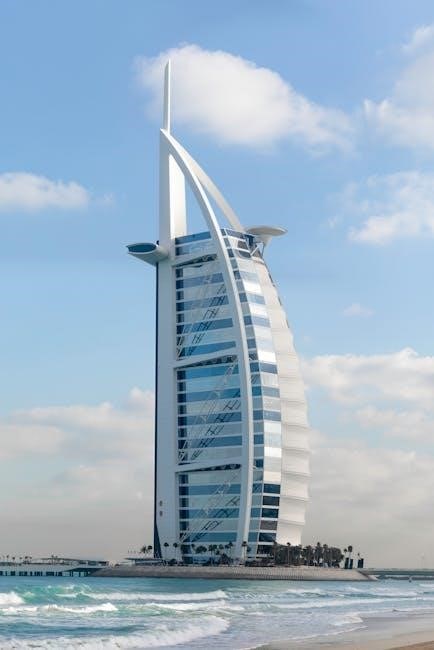
Key Findings from Dubai Leaks
Dubai Leaks exposed the extent of foreign property ownership‚ revealing 191‚000 foreign owners among 274‚000 properties. It also uncovered involvement of criminals‚ sanctioned individuals‚ and politically exposed persons (PEPs)‚ shedding light on illicit activities.
3.1. Extent of Foreign Property Ownership in Dubai
The Dubai Leaks revealed that foreign nationals own a significant portion of properties in Dubai‚ with 191‚000 foreign owners among the 274‚000 property holders identified in the leaked data. This represents a substantial presence of international investors in Dubai’s real estate market. The leaks highlighted the diversity of nationalities involved‚ with individuals from various countries‚ including those linked to criminal activities or under international sanctions. This extensive foreign ownership underscores Dubai’s appeal as a global hub for property investment‚ attracting individuals seeking lucrative opportunities and financial secrecy. The data also exposed how foreign buyers often exploit Dubai’s lenient regulatory environment to purchase properties anonymously‚ further complicating efforts to track illicit financial flows. These findings have raised concerns about the transparency and accountability of Dubai’s real estate sector‚ emphasizing the need for stricter oversight to curb potential misuse by criminal and sanctioned entities.
3.2. Involvement of Criminal and Sanctioned Individuals
The Dubai Leaks PDF exposed a significant number of properties linked to criminal and sanctioned individuals‚ revealing Dubai’s role as a haven for illicit activities. High-profile figures‚ including sanctioned politicians and individuals connected to organized crime‚ were found to own luxury properties in exclusive areas like Emirates Hills. The data highlighted cases of international criminals‚ such as Russian oligarchs and members of groups like Hezbollah‚ who have invested heavily in Dubai’s real estate. These findings suggest that Dubai’s property market has been exploited to launder money and conceal assets‚ raising concerns about the emirate’s regulatory frameworks. The leak also revealed connections to notorious individuals‚ such as the “Cryptoqueen” Ruja Ignatova‚ who used Dubai as a refuge. This exposure has prompted international scrutiny‚ questioning how such individuals could operate undetected in a city often criticized for its financial secrecy and lax enforcement.
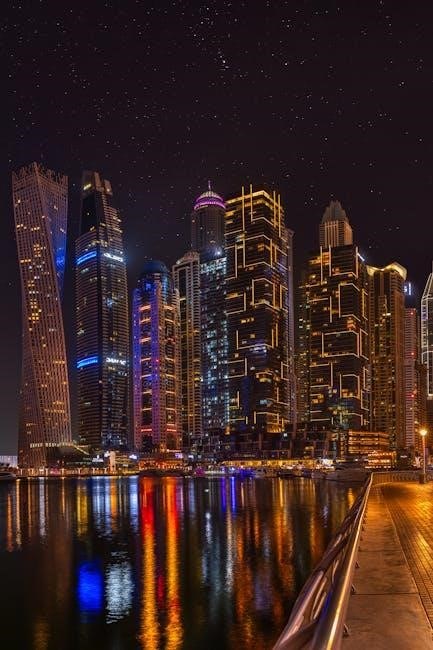
3.3. Exposure of Politically Exposed Persons (PEPs)
The Dubai Leaks PDF brought to light the significant involvement of Politically Exposed Persons (PEPs) in Dubai’s property market. Elected officials‚ high-ranking government figures‚ and individuals with political influence were found to own numerous luxury properties in the emirate. The leak revealed that many of these PEPs had acquired properties in Dubai’s exclusive neighborhoods‚ such as Emirates Hills‚ often through secretive mechanisms like offshore accounts. This raised concerns about potential corruption‚ money laundering‚ and conflicts of interest. The data showed that some PEPs had purchased properties worth millions of dollars‚ sparking questions about the source of their funds. The exposure of these individuals has led to increased scrutiny of Dubai’s real estate market and its role in harboring wealth linked to political power. This revelation underscores the broader issue of financial secrecy in Dubai and its appeal to those seeking to conceal their assets. The leak has prompted calls for greater transparency and accountability in the emirate’s financial systems.
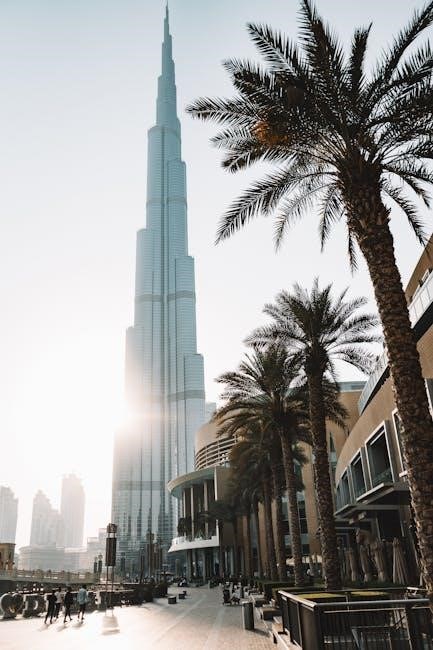
Implications of Dubai Leaks
Dubai Leaks exposed widespread property ownership by criminals‚ sanctioned individuals‚ and PEPs‚ impacting the real estate market‚ sparking political fallout‚ and straining international relations‚ prompting calls for transparency and regulatory reforms in Dubai.
4.1. Impact on Dubai’s Real Estate Market
The Dubai Leaks PDF has revealed significant insights into the emirate’s real estate market‚ exposing widespread foreign ownership and the involvement of criminal and sanctioned individuals. This has raised concerns about the transparency and regulation of Dubai’s property sector‚ which is a cornerstone of its economy. The leaks have shown that foreigners‚ including those linked to illicit activities‚ own a substantial portion of the properties‚ potentially undermining public trust in the market. The exposure of such dealings could lead to a decline in investor confidence‚ particularly among legitimate buyers who may now view Dubai’s real estate market as a high-risk investment. Additionally‚ the revelations may prompt stricter regulatory measures‚ which could alter the dynamics of the market and impact future investments. The long-term implications for Dubai’s real estate market remain uncertain‚ but the leaks have undeniably cast a shadow over its reputation as a secure and stable investment destination.
4.2. Political and Diplomatic Fallout
The Dubai Leaks PDF has sparked significant political and diplomatic repercussions‚ as the revelations about property ownership have implicated high-profile individuals and entities. The exposure of sanctioned individuals‚ criminals‚ and Politically Exposed Persons (PEPs) owning property in Dubai has raised questions about the emirate’s regulatory frameworks and its willingness to combat illicit financial activities. This has led to increased scrutiny from international governments and organizations‚ potentially straining diplomatic relations. Several countries‚ whose citizens or entities have been implicated in the leaks‚ have expressed concerns about the lack of transparency in Dubai’s real estate market. The leaks have also highlighted the role of Dubai as a hub for individuals seeking to hide assets‚ which could lead to calls for stronger international regulations and cooperation to curb such practices. The fallout may result in heightened pressure on Dubai to implement reforms and improve oversight to maintain its reputation as a global financial hub.
4.3. International Relations and Sanctions
The Dubai Leaks PDF has had profound implications for international relations‚ as the exposure of sanctioned individuals and criminal entities owning property in Dubai has raised concerns about the emirate’s compliance with global sanctions. This has led to increased tensions between the UAE and countries whose sanctions were bypassed. The leaks have revealed that Dubai’s real estate market has been utilized by individuals and groups under international sanctions‚ including those linked to organizations like Hezbollah. As a result‚ there are growing calls for the UAE to enforce stricter measures to prevent such activities. The international community is urging Dubai to increase transparency and cooperation to avoid potential sanctions themselves. The revelations have also sparked debates about the effectiveness of current sanctions regimes and the need for stronger enforcement mechanisms. This diplomatic strain may lead to a reevaluation of Dubai’s role as a global financial hub and its relationships with key international partners.

Response to Dubai Leaks
Dubai and UAE authorities have acknowledged the leaks‚ launching investigations and pledging reforms to enhance transparency. International communities have expressed concern‚ urging stricter oversight to prevent illicit activities and maintain global financial integrity.
5;1. Official Response from Dubai and UAE Authorities
Dubai and UAE authorities have responded to the leaks by initiating investigations and emphasizing their commitment to transparency. They have pledged to strengthen regulatory frameworks to prevent illicit activities and maintain Dubai’s reputation as a global financial hub.
Officials have acknowledged the significance of the leaked data but highlighted existing measures to combat financial irregularities. They have also assured international partners of their dedication to collaboration in addressing global financial crimes.
The UAE government has reiterated its stance against money laundering and corruption‚ vowing to implement stricter oversight mechanisms. This response aims to restore confidence in Dubai’s real estate market and uphold its position as a secure and trustworthy financial center.
5.2. Reaction from the International Community
The Dubai Leaks PDF has sparked significant concern globally‚ with international bodies and governments calling for greater transparency in Dubai’s financial and property sectors. The revelations have raised questions about the emirate’s role in facilitating illicit financial activities and harboring sanctioned individuals.
International activists and journalists have praised the leak for exposing systemic issues‚ while critics argue it undermines Dubai’s reputation as a secure financial hub. Diplomatic tensions have risen‚ with some nations urging stricter oversight to prevent further exploitation of Dubai’s real estate market.
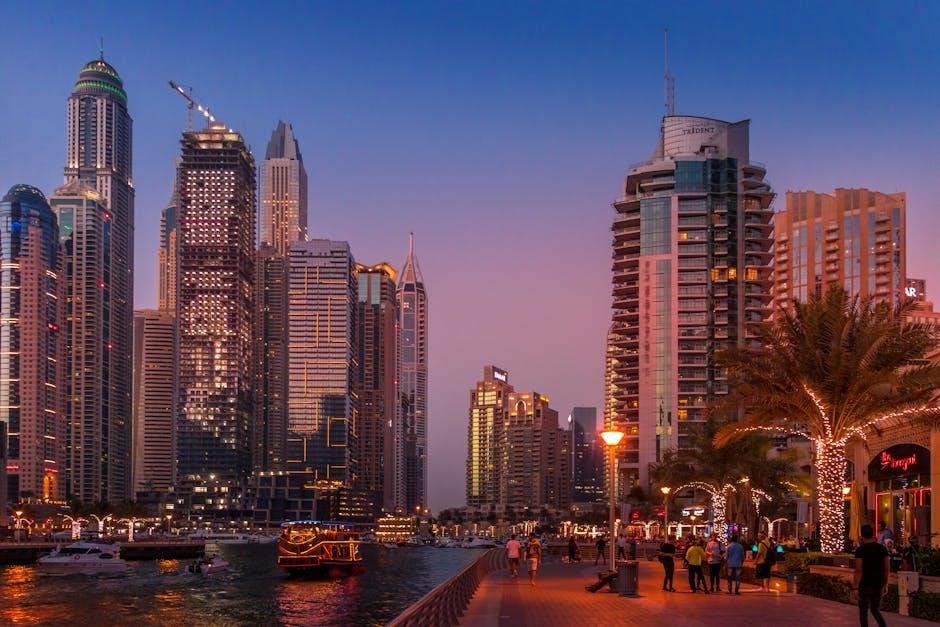
The leak has also prompted calls for global cooperation to combat money laundering and corruption. International organizations are now scrutinizing Dubai’s regulatory frameworks‚ potentially leading to revised policies to address the vulnerabilities exposed by the leak.
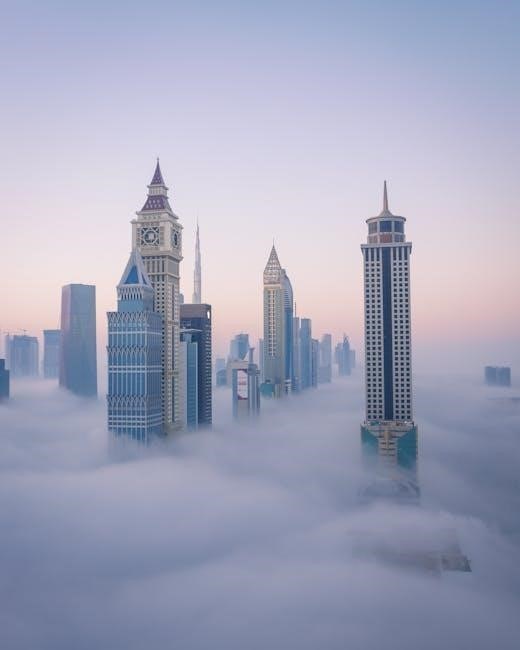
Role of Investigative Journalism in Dubai Leaks
Investigative journalism played a pivotal role in uncovering the Dubai Leaks PDF‚ shedding light on the secretive property ownership and financial dealings in Dubai. Collaborative efforts between journalists and organizations like the Center for Advanced Defense Studies (C4ADS) and Norwegian newspaper E24 were instrumental in analyzing and disseminating the leaked data.
The investigative work revealed how Dubai’s real estate market became a haven for sanctioned individuals‚ criminals‚ and politically exposed persons (PEPs). Journalists meticulously cross-referenced property records with global sanctions lists‚ exposing illicit networks and hidden wealth.
Their reporting not only highlighted the scale of foreign property ownership but also uncovered the mechanisms used to exploit Dubai’s financial secrecy. This investigative effort has sparked widespread scrutiny‚ prompting calls for greater transparency and accountability in Dubai’s financial systems.
The role of investigative journalism in the Dubai Leaks underscores the importance of a free press in exposing systemic issues and holding power to account‚ ultimately contributing to global efforts to combat financial corruption.

Broader Context of Financial Secrecy in Dubai
Dubai‚ a global financial hub‚ thrives on secrecy‚ attracting illicit activities like black-market gold trade and arms trafficking. The leaks expose how offshore accounts and property investments enable criminals and sanctioned individuals to operate undetected.
7.1. Dubai as a Global Financial Hub
Dubai has emerged as a pivotal global financial hub‚ bridging Europe‚ Asia‚ and Africa. Its strategic location‚ business-friendly environment‚ and world-class infrastructure attract international investments and corporations. The city’s free zones‚ tax exemptions‚ and luxurious lifestyle make it a magnet for wealth and capital.
However‚ Dubai’s financial secrecy and lax regulatory enforcement have also made it a hotspot for illicit activities. The leaks revealed how criminals‚ sanctioned individuals‚ and politically exposed persons exploit Dubai’s system to launder money and hide assets. This duality underscores the city’s complex role in global finance.
The combination of luxury property markets‚ offshore accounts‚ and high levels of secrecy creates an environment where illicit wealth can thrive unnoticed. Dubai’s appeal to both legitimate investors and criminal actors highlights its significance in the global economy and its challenges in combating financial crimes.
7.2. Role of Offshore Accounts and Property Investments
Offshore accounts and property investments play a significant role in Dubai’s financial landscape‚ often serving as tools for wealth management and privacy. The leaked data reveals how individuals‚ including criminals and politically exposed persons (PEPs)‚ utilize Dubai’s real estate market to conceal assets and launder money; Property investments‚ particularly in luxury developments‚ are frequently tied to offshore accounts‚ enabling owners to maintain anonymity and bypass regulatory scrutiny.
Dubai’s allure lies in its combination of financial secrecy‚ minimal oversight‚ and high-value property. Offshore accounts facilitate the movement of funds‚ while property investments provide a tangible asset to store wealth discreetly. This system has attracted not only legitimate investors but also illicit actors seeking to hide their finances. The leaks expose how such mechanisms are exploited‚ highlighting the vulnerabilities in Dubai’s financial framework.
The interplay between offshore accounts and property investments underscores Dubai’s dual role as both a global financial hub and a haven for secretive transactions. While these practices contribute to the city’s economic growth‚ they also raise concerns about transparency and compliance with international financial regulations.

Future Implications of Dubai Leaks
The Dubai Leaks PDF has far-reaching implications‚ potentially reshaping global perceptions of Dubai as a financial hub. The exposure of widespread offshore accounts and property investments tied to illicit activities may prompt increased regulatory scrutiny and calls for transparency. Governments and international bodies could impose stricter measures to combat money laundering and tax evasion‚ impacting Dubai’s allure as a secrecy-friendly destination.
The leaks may also lead to reforms in UAE property laws‚ enhancing due diligence and ownership disclosure requirements. This could deter criminal and sanctioned individuals from using Dubai’s real estate market for illicit purposes. Additionally‚ the revelations might prompt investors to reassess their involvement in Dubai’s property sector‚ potentially affecting market stability.
Long-term‚ Dubai may face challenges in balancing its reputation as a global financial center with the need to address systemic vulnerabilities exposed by the leaks. The aftermath could also influence international relations‚ as countries demand greater cooperation in combating financial crimes linked to Dubai.
The Dubai Leaks PDF has unveiled a complex web of property ownership and financial secrecy‚ exposing how Dubai’s real estate market has become a haven for illicit activities. The revelations highlight the emirate’s role as a global hub for wealth concealment‚ involving criminals‚ sanctioned individuals‚ and politically exposed persons. This leak underscores the urgent need for greater transparency and regulatory oversight in Dubai’s financial systems.
The implications extend beyond local borders‚ affecting international relations and anti-money laundering efforts worldwide. The findings also raise questions about the sustainability of Dubai’s model as a secretive financial hub. Moving forward‚ the leaks may prompt reforms to address systemic vulnerabilities and enhance accountability.



Leave a Reply
You must be logged in to post a comment.